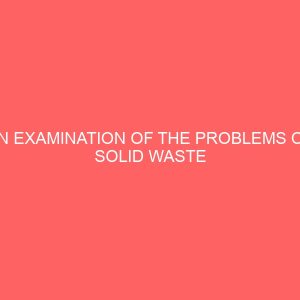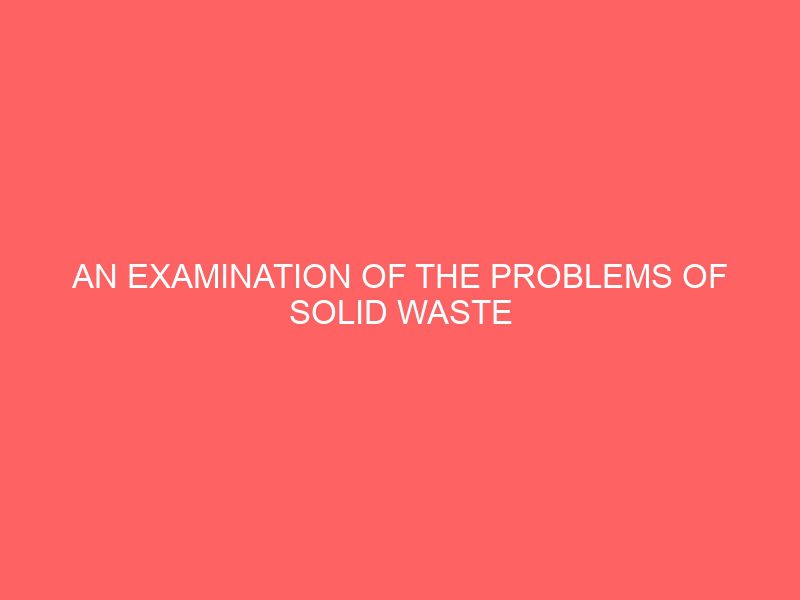Description
Examination of problems associated with solid waste management in Nigeria
CHAPTER ONE
INTRODUCTION
1.1 Background to the Study
This project is on An examination of the problems of solid waste management in Nigeria. The management of urban solid wastes constitutes one of the immediate and serious environmental problems facing governments in African cities (Baumgartner, 2003). The conventional municipal solid waste management approach, based on collection and disposal, has failed to provide efficient and effective services to all urban residents (Vancini, 2000). The urban environment steadily degrades due to large volumes of waste which are not efficiently managed. In Nigeria, it is common to find large heaps of garbage and other wastes all over the cities. Abugo (1999) reported that 35% of Ibadan’s household, 33% of Kaduna’s and 44% of Enugu’s do not have access to waste collection and disposal services. Odeyemi and Onibokun (1997) described Lagos as the dirtiest capital in the world. In most parts of the cities, streets are partially or wholly blocked by solid wastes. Similarly, open spaces and market places are littered with solid wastes. In most cases, drains are clogged or totally blocked and many compounds are hemmed in by solid wastes. However, this deplorable situation is not peculiar to Nigerian cities.
The concern over solid waste is generated from an aesthetic desire to live in a clean environment and also from the realization that a dirty and cluttered environment is unhealthy and unsafe for the population. This is evident in the incorporation of environmental sanitation as a component of primary health care adopted by the World Health Organization at the Alma Ata Declaration in September, 1978 (WHO, 1978). This was also clearly pointed out at the Istanbul Declaration and the Habitat Agenda for 1988. It was stated that sustainable human settlements depend on the creation of better environment for human health and wellbeing which will improve the living conditions of people and of their lives (United Nations for Human Settlement, 1998).
In spite of the landmark achievements recorded by the developed countries, they are still faced with the potential risks to health and to environment from handling solid and liquid wastes.
In Nigeria, the problem of solid waste is manifested with its consequent effects on pollution of water, air and land with the hazards to health and other natural resources of social and economic importance (Federal Ministry of Housing and Environment, 1982).
There has been an increasing concern about the serious health implications from waste management in Nigeria. Some priority programmes embarked upon by FEPA include waste management education, awareness and publication of relevant information, commitment of appreciable amount of fund, renewal of equipment/facilities and training of manpower. However, solid waste management is still one of the most serious challenges facing the country. This research therefore, tried to find out the problems of solid waste management in Nigeria.
1.2 Statement of the Problem
When wastes are not collected, in sanitary conditions develop and pose environmental and human health risks. The prevalence of parasites, vectors, tetanus, malaria, hookworm, cholera and diarrhea in most African cities is attributed to the in sanitary conditions in these cities (Agbola,1997 ). Mentel (2006) observed that malaria, diarrhea, intestinal worms and upper respiratory tract infections were among the most common health problems reported at out- patient facilities in the Greater Accra Region of Ghana. In the city of Accra, major health problems are diseases attributed to poor environmental sanitation, which is exacerbated by ignorance and poverty (Vancini,2000). In Tanzania, Pohjola and Tanskanee (1998) reported that poor sanitation, and improper waste disposal practices result in the spread of infectious diseases, which are believed to be the most frequent causes of morbidity and mortality.
Wastes dump into storm drainage channels, creeks, lagoons and other water impoundment points create serious environmental problems which can result into disastrous situations. The loss of lives and property, which occurred due to the 1982, 2010 and 2011 floods in Ibadan, Lagos, Port Harcourt, Aba, Kano, Jigawa and Sokoto were attributed to the accumulation of refuse which blocked drainage channels(Love, 2002).
The alarming rate at which heaps of solid wastes continue to occupy our cities, coupled with the fact that 87% of Nigerians still use disposal methods, adjudged to be in sanitary, has not only constituted visual blight and odour nuisance, but also encouraged the breeding of rodents, mosquitoes and other pests of public health importance, which lead to disease outbreaks in Nigeria(Johnstone,2000). The ineffectiveness of contemporary municipal solid waste management practices,( which culminates in a number of health and environmental problems), has necessitated the need to evaluation of solid waste management practices among the Health workers and Head of house hold in Nigerian cities.
1.3 Research Questions
Specifically, this research attempts, to find answers to the following questions:
- How adequate are funds provided for solid waste management in Nigeria?
- How adequate are facilities/equipment provided for solid waste management in Nigeria?
- How adequate are personnel for solid waste management in Nigeria?
- How is the existing policy on environmental issues affect solid waste management in Nigeria?
- What is the level of community participation in solid waste management in Nigeria?
- What is the adequacy of public enlightenment for solid waste management in Nigeria?
1.4 Purpose of the Study
The main objective of this study was to assess the problems of solid waste management in Nigeria. The specific objectives of the study include:-
- To determine whether the funds provided are adequate for solid waste management in Nigeria.
- To determine whether facilities/ equipment are available for solid waste management in Nigeria.
- To determine whether personnel are adequate for solid waste management in Nigeria.
- To determine whether existing environmental policy is adequate for solid waste management in Nigeria.
- To determine whether community participation is adequate for solid waste management in Nigeria.
- To determine whether public enlightenment is adequate for solid waste management in Nigeria.
1.5 Significance of the Study
- The findings of this study will bring to light the problems associated with solid waste collection and disposal in Nigeria.
- The findings of this study will show whether adequate facilities and equipment are provided for solid waste management in Nigeria.
- The study will help in providing accurate information, education and health messages suitable for sensitizing the people on the importance of effective waste management practice and how it would positively promote their health.
- The study will highlight effective methods of waste disposal, as well as help to identify specific roles of both the government and the individual in terms of waste collection and final disposal.
- The result will also reveal the institutional problems to solid waste management, and highlight the effective systems of storing and evacuation of wastes, which would help both policy makers, professionals in the field of environmental health, researchers and the public to know the appropriate disposal sites and equipment to be used in disposing solid wastes in their communities.
1.6 Basic Assumptions
On the basis of available research evidence and professional opinion, the following assumptions were made for the purpose of this study:
- Adequate funding is necessity for solid waste management.
- Adequate environmental facilities/ equipment are necessities for solid waste Management.
- Adequate and trained personnel are part of the solution to effective solid waste management.
- Lack of effective environmental policies is a factor in solid waste management.
- Community participation and involvement are the answers to effective solid waste management.
- Public enlightenment is key to a successful solid waste management.
1.7 Hypotheses
Based on the research questions, the following major and sub- hypotheses were generated for the purpose of this study:
Major Hypothesis
Adequacy of problems is not significant in solid waste management among Health workers and Heads of household in Nigeria.
Sub-hypotheses
- Adequacy of funds is not a significant constraint to solid waste management among health workers and heads of house hold in Nigeria
- Adequacy of facilities/equipment is not a significant constraint to solid waste management among Health workers and heads of household in Nigeria
- Adequacy of trained personnel is not a significant problems to solid waste management among Health workers and heads of household in Nigeria
- Adequacy of environmental policy is not a significant constraint to solid waste management among Health workers and heads of household in Nigeria
- Community participation is not a significant constraint to solid waste management among Health workers and Head of house hold in Nigeria.
- Adequacy of public enlightenment is not a significant constraint to solid waste management among Health workers and heads of household in Nigeria.
1.8 Delimitation of the Study
This study is delimited to evaluating solid waste management problems among Health Workers and Heads of house hold in the states selected from the six(6) geo- political zones of Nigeria.
1.9 Definition Of Terms
Waste: Any thing that is solid, liquid or gaseous, which has been either over used or under used, or which is considered as worthless, and therefore discarded; which if not properly disposed, could be dangerous to health.
Solid waste: This is also called refuse, It refers to wastes which are in solid form, e.g. cans, plastics, rubber, which include residential, commercial, institutional, municipal, and agricultural wastes.
Solid waste disposal: The disposal of solid waste materials which are considered useless or worthless and or hazardous, and which results from human or animal activities.
Problems: These refer to problems of funds, personnel, equipment, non-community participation, education and environmental policies that hinder effective solid waste management in Nigeria.
Waste management: This refers to the physical means employed in other to remove waste from the community.
Urban areas: All towns designated as state capitals in Nigeria.
Solid waste management: The process of collection, storage and disposal of wastes (refuse).
Health worker: This refers to registered and licensed environmental Health Personnel in Nigeria.
Head of household: This refers to a person who direct and coordinate the affairs of members of his families residing in the same premises.
This Complete Final Year Research Academic Project Work For Undergraduate Students Is On: Examination of problems associated with solid waste management in Nigeria







